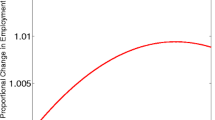Abstract
This paper uses British longitudinal data to model self-employment status. In contrast to previous studies, the modelling approach accounts for state-dependence and unexplained heterogeneity effects. The paper concludes that state dependence is an important influence on self-employment choice. Someone self-employed last year is, controlling for observable and unobservable influences, 30 percentage points more likely to be self-employed this year than someone who was in paid employment a year ago. We also find significant individual heterogeneity in the probability of self-employment, with significant explained influences operating through gender, educational attainment, occupation, spouse's self-employment, and parental and educational background. Significant, though quantitatively smaller influences come though initial financial circumstance and current house price movements. Local labour market shocks do not appear significantly to influence self-employment choice. This we conclude that the autoregressive nature of self-employment time-series would appear to be a structural rather than a cyclical phenomenon.
Similar content being viewed by others
References
Arulampalam, W., 1999, 'A Note on Estimated Coefficients in Random Effects Probit Models', Oxford Bulletin of Economics and Statistics 61(4), 597-603.
Arulampalam, W., A. L. Booth and M. P. Taylor, 2000, 'Unemployment Persistence', Oxford Economic Papers 52, 24-50.
Barmby, T., 1998, 'The Relationship between Event History and Discrete Time Duration Models: An Application to the Analysis of Personnel Absentessism', Oxford Bulletin of Economics and Statistics 60(2), 261-265.
Black, J., D. DeMeza and D. Jeffreys, 1996, 'House Prices, the Supply of Collateral and the Enterprise Economy', Economic Journal 106(434), 60-75.
Blanchflower, D. G. and A. J. Oswald, 1998, 'What Makes an Entrepreneur?', Journal of Labor Economics 16(1), 26-60.
Cowling, M. and P. Mitchell, 1997, 'The Evolution of UK Self-employment: A Study of Government Policy and the Role of the Macroeconomy', The Manchester School 65(4), 427-442.
Cressy, R., 1996, 'Are Business Start-ups Debt-rationed?', Economic Journal 106(438), 1253-1270.
Evans, D. S. and B. Jovanovic, 1989, 'An Estimated Model of Entrepreneurial Choice Under Liquidity Constraints', Journal of Political Economy 97(4), 808-827.
Evans, D. S. and L. S. Leighton, 1989, 'Some Empirical Aspects of Entrepreneurship', American Economic Review 79, 519-535.
Greene, W. M., 2000, Econometric Analysis, 4th ed., London and New Jersey: Prentice Hall International.
Heckman, J. J., 1979, 'Sample Selection Bias as a Specification Error', Econometrica 47, 475-492.
Heckman, J. J., 1981a, 'Statistical Models for Discrete Panel Data', in C. F. Manski and D. McFadden (eds.), Structural Analysis of Discrete Data with Econometric Applications, Cambridge MA: MIT Press.
Heckman, J. J., 1981b, 'The Incidental Parameters Problem and the Problem of Initial Conditions in Estimating a Discrete Time-discrete Data Stochastic Process', in C. F. Manski and D. McFadden (eds.), Structural Analysis of Discrete Data with Econometric Applications, Cambridge MA: MIT Press.
Heckman, J. J., 1981c, 'Heterogeneity and State Dependence', in S. Rosen (ed.), Studies in Labor Markets, Chicago, IL: Chicago Press.
Henley, A., 1998, 'Changes in the Distribution of Housing Wealth in Great Britain 1985–1991', Economica 65(3), 363-380.
Holtz-Eakin, D., D. Joulfaian and H. S. Rosen, 1994, 'Entrepreneurial Decisions and Liquidity Constraints', Rand Journal of Economics 25(2), 334-347.
Le, A. T., 1999, 'Empirical Studies of Self-employment', Journal of Economic Surveys 13(4), 381-416.
Lindh, T. and H. Ohlsson, 1996, 'Self-employment and Windfall Gains: Evidence from the Swedish Lottery', Economic Journal 106(439), 1515-1526.
Orme, C. D., 1999, Two-step Inference in Dynamic Non-linear Panel Data Models, unpublished paper, School of Economic Studies, University of Manchester.
Reynolds, P. D., 1997, 'Who Starts New Firms? — Preliminary Explorations of Firms in Gestation', Small Business Economics 9(5), 449-462.
Storey, D. J. and S. Johnson, 1987, Are Small Firms the Answer to Unemployment?, London: Employment Institute.
Taylor, M. P., 1996, 'Earnings, Independence or Unemployment: Why Become Self-employed?', Oxford Bulletin of Economics and Statistics 58(2), 253-265.
Taylor, M. P., 1999a, 'Survival of the Fittest? An Analysis of Self-employment Durations in Britain', Economic Journal 109(454), C140-C155.
Taylor, M. P., 1999b, 'Self-employment and Windfall Gains in Britain, Evidence from Panel Data', Discussion Paper No. 2084, Centre for Economic Policy Research, London (February).
Westhead, P. and M. W. Wright, 1999, 'Contributions of Novice, Portfolio and Serial Founders Located in Rural and Urban Areas', Regional Studies 33(2), 157-173.
Yamaguchi, K., 1991, Event History Analysis, Newbury Park, CA: Sage.
Author information
Authors and Affiliations
Rights and permissions
About this article
Cite this article
Henley, A. Self-Employment Status: The Role of State Dependence and Initial Circumstances. Small Business Economics 22, 67–82 (2004). https://doi.org/10.1023/B:SBEJ.0000011573.84746.04
Issue Date:
DOI: https://doi.org/10.1023/B:SBEJ.0000011573.84746.04



